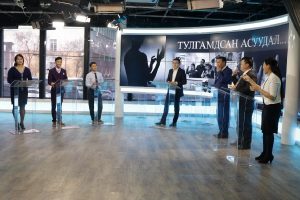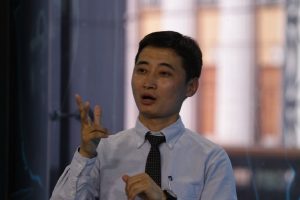-
What We Do
- WHERE WE WORK
-
About Us
 Welcome Message from Carol Jenkins
Welcome Message from Carol JenkinsFor more than 90 years, World Learning has equipped individuals and institutions to address the world’s most pressing problems. We believe that, working together with our partners, we can change this world for the better.
On my travels, I’ve had the opportunity to meet with many of those who have joined us in this mission. In Baghdad, we’ve trained more than 2,300 Iraqi youth who are already giving back at home. In London, our partners in the TAAP Initiative strongly believe that we are all responsible to practice inclusion. And in Vermont, our Experiment in International Living and School for International Training participants prove every day that they have the tools and the determination to change the world.
Please join us in our pursuit of a more peaceful and just world.
- Get Involved
Media Center > Story
Mongolia Grapples With Deaf Education in Not-So-Silent Debate
July 13, 2017
Earlier this year, a group of protesters gathered outside of Ulaanbaatar’s School 29 — the only school for deaf and hard-of-hearing students in all of Mongolia. They held up signs declaring, “We can’t understand our lessons. You’re violating our right to an education. Carry out all classes in sign language.” These student protesters argued they only wanted the same rights as any other student in Mongolia: equal access to quality education and the ability to be taught in their own language.
Mongolia approved sign language as the native language for deaf and hard of hearing citizens in February 2016, when it adopted its Law on the Rights of Disabled People. But students say their right to be taught in sign language is not being upheld at School 29, where almost half their teachers do not know the language well enough.

That student protest has since sparked a wider public debate. In May, Mongol TV’s primetime Nuudel Shiidel program aired a live panel debate titled “Silent Discussion,” featuring six guests from the deaf and hard-of-hearing community, including one of the student protesters. It was Mongolia’s first-ever public discussion hosted in sign language. “Mongol TV has been following the story since students protested for better quality education,” says Lkhagya Erdene, executive news producer at Mongol TV and moderator of the panel. “We wanted to hear from the deaf community.”
As a LEAD Mongolia Fellow, Erdene is committed to using his role in the media to amplify the voices of Mongolia’s diverse populations. LEAD (Leaders Advancing Democracy) is a World Learning program funded by USAID, which is working with some of Mongolia’s best and brightest emerging democracy advocates. LEAD Fellows represent all different sectors of society, but they have a common ambition to spur positive change on the issues they care about most.
The idea for a sign language debate was born in May at the regional LEAD Alliance Summit, which connects LEAD Mongolia Fellows with like-minded peers from Bhutan, Kyrgyzstan, and Myanmar. During a coffee break, Erdene struck up a conversation with program mentor Oyungerel Tsedevdamba, a Mongolian author and human rights activist. “She pitched me [the idea to host the first-ever] deaf panel on prime-time television,” Erdene says. “I had to do it. Our audiences and society need to hear what the marginalized groups have to say if we want to build a humane, democratic society.”

Silent Discussion’s six panelists had much to say through their interpreters. Nemekhbayar Batnasan — another LEAD Fellow who is also a project manager at the Deaf Information Center in Ulaanbaatar — argued that the community’s biggest challenge is poor access to sign language interpreters. “There are 65 television channels [in Mongolia] but only Mongolian National Broadcast sign interprets its 45-minute news program,” Batnasan explained in a later interview. None of the country’s public service institutions provide interpreters either.
Batnasan further argues that little progress has been made toward ensuring equal rights to education, employment, and health services for the deaf and hard-of-hearing community. The student protests at School 29 highlight that lack of progress: When students are not taught in their native sign language, they may not gain sufficient literacy skills to enroll in institutions of higher education — which in turn limits their future job prospects. They are left behind.
It is uncertain how long it will take for the deaf community to fully access their rights to basic services, but the community maintains hope. Silent Discussion caught the attention of the Mongolian public, leading to further debate on social media. Erdene, who promises to continue covering disability issues, hopes the panel will inspire many others to stand up in support of the deaf community. Meanwhile, Batnasan encourages young people with hearing impairment to create their own opportunities. “You are young and there are many things to do for our future,” he says. “Continue your fight for equal access to education. Be consistent and results will come.”
World Learning’s LEAD Mongolia program strives to forge meaningful connections whereby emerging leaders like Erdene and Batnasan can meet, exchange views, and push forward important dialogue. Further, the LEAD Alliance Summit implemented by IRI provided a critical networking opportunity to initiate new ideas, such as Silent Discussion. The program is made possible with funding the U.S. Agency for International Development (USAID).
Written by: Munguntuya Otgonjargal, World Learning Mongolia’s Training Program Officer and Adam LeClair, World Learning Project Director for LEAD Mongolia.





